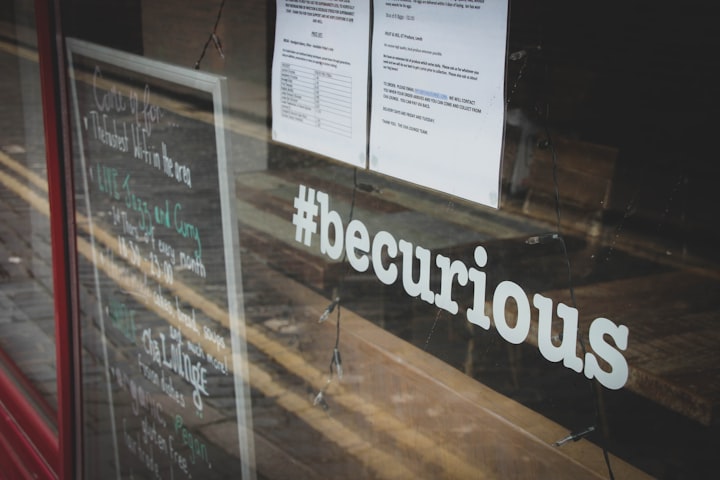Be Kind to Your Curiosity
It's the intersection between creativity and genius.

When I was nine or ten, this old lawnmower we had stopped working. The engine seized one day while my dad was out mowing the lawn.
My younger brother - who was only eighteen months my junior - and I decided it would be a good idea to take apart the two-cylinder motor, sure we could fix it.
Sometimes naivety and luck work together in your favor.
Such was the case that warm summer morning. We quickly figured out how to remove the motor from atop the lawnmower by detaching the blade and removing a few heavy screws from the undercarriage. We might have given up had the motor construction not been so simple: essentially the carburetor and the pistons. We removed the piston heads then worked the pistons with WD-40 and all the muscle of our adolescent arms until the pistons were moving freely again.
Turns out, the motor really just needed oil, and the damage wasn't irreversible.
The rest of the story is a bit fuzzy but I do remember we spent most of the rest of that day building a very heavy wood frame for a go-cart we were going to put the motor on. Further dismantling the lawnmower, we used the wheels from the mower for our go-cart as well.
The go-cart never functioned - we couldn't figure out how to attach the shaft of the motor to the axle of the go-cart in a way that would make the wheels turn.
I'm not sure our parents knew what we were doing until it was too late to stop us. To their credit, they didn't crush our dreams of building the fastest (maybe the only) go-cart in the neighborhood. They just let us work, feeding our curiosity.
I had what felt like an insatiable curiosity growing up. When the first cordless phone we ever owned stopped working, I disassemble that too, sure I could turn it into a remote garage door opener - because garages and automatic openers were just becoming a thing.
Curiosity is an innate part of every person. As anyone who has ever interacted with children knows "why?" is their favorite question. Curiosity fuels our drive and our ability to learn.
As we grow older, that in-born curiosity tends to wane with so many of us. Our worldview becomes increasingly constricted by tightly held opinions and daily pressures from work, family, friends, and community.
What we lose sight of, unfortunately, is this: curiosity helps us expand our worldview and helps lessen the pressure we feel from all sides. Curiosity helps us in our work, in our relationships, and in the ways we serve and build our communities.
How often does this scenario play out in your life?
- You come home from a long day at work.
- Your partner asks you how the day was.
- You regurgitate the drama of the day, reciprocate the question, then settle down in front of the TV, tablet, or phone for hours of mindless viewing.
Probably more often than you'd care to admit; certainly more often than I'd care to admit for myself.
What if, instead of getting locked in the cycle of repeating drama, we engaged in activities that were interesting to us (doom-scrolling social media doesn't count)?
When my wife and I were younger, I loved reading books with her. We would sometimes sit in bed at the end of the day and read together for an hour or more. Often, I would read aloud. It didn't matter what the book was about. We just loved to read together.
Over the years, we gave that habit up. I blamed being so tired at the end of the day.
A few weeks ago, I realized (again) the power of the micro-habit of reading just 5 pages a day. In most books, that's less than 10 minutes of reading. Over the course of a year, however, that adds up to 1,825 pages or roughly 9 books.
Reading, perhaps more than any other activity, fuels curiosity.
Here's where being kind to your curiosity comes into the picture. If, like me, you're tired at the end of the day, you might not remember a lot of what you read or engage in. Sometimes I have a hard time even getting the words out right. Sometimes, I'm so tired I have to stand next to our bed to stay awake.
And I love it.
I love the simple activity of reading with my wife. The things we read, even when I don't remember much, help expand our conversations from the more mundane aspects of everyday life to things far more elevated.
Maybe you're not into reading. The point here is that 10 minutes isn't very much time. No matter how busy you are, you can give yourself permission to be curious for 10 minutes everyday.
Michael Thompson recently said:
Curiosity is a word that was meant to be followed.
I'm taking to heart what Michael said. I'm giving myself permission to follow my curiosity for no other reason than to be curious. It doesn't have to lead anywhere. Curiosity can be an end unto itself.
- Care to know more about what makes a space shuttle take flight? Read an article or watch a YouTube video.
- Interested in the flora and fauna of the Amazon rainforest? Dive in.
- Want to learn how to make sourdough bread? Give it a shot.
Being curious is just about expanding our ability to think creatively, and enjoy ourselves while doing it. It doesn't have to be related to employment, anything your kids might be studying in school (or you might be studying), or anything else. You can be curious just for the sake of being curious.
Go ahead! Give yourself permission to be curious about something. You might be surprised what you fall in love with.
Thanks for reading!
About the Creator
Aaron Pace
Married to my best friend. Father to five exuberant children. Fledgling entrepreneur. Writer. Software developer. Inventory management expert.






Comments (1)
Agree 👌